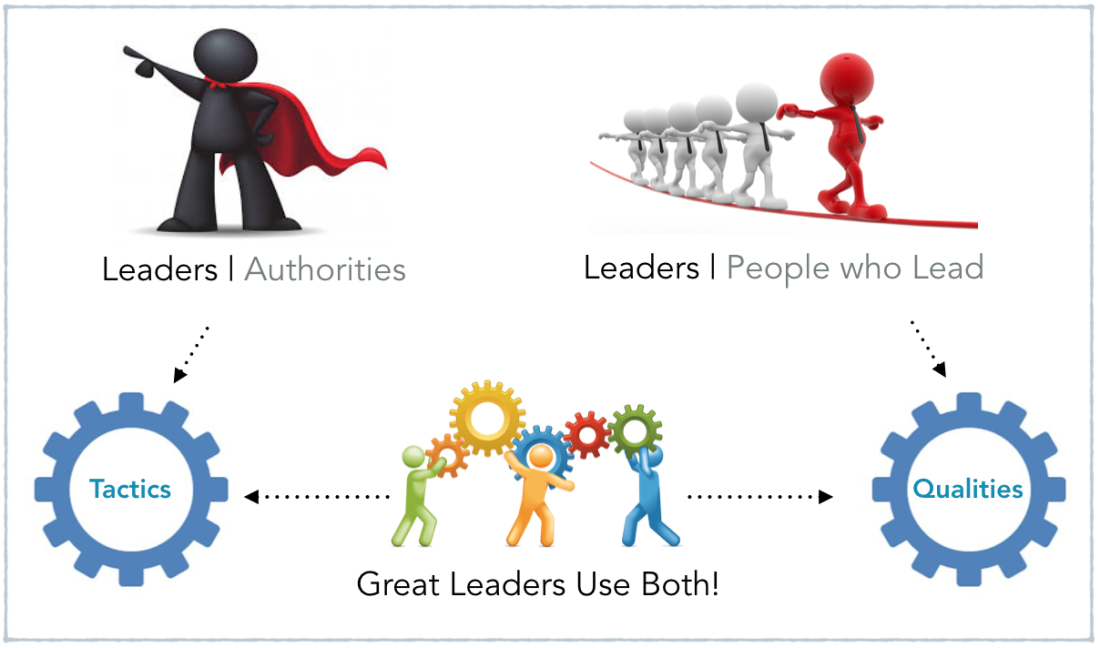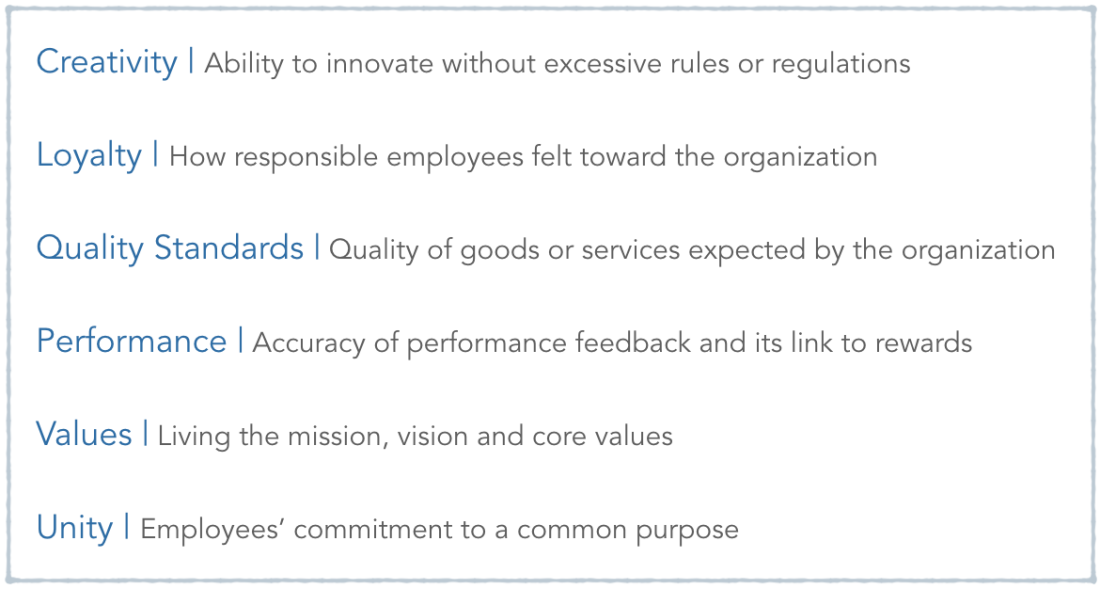
Leaders, in the form of authorities, have been assigned to that role. Their title may give them power over others but rank does not automatically transform someone into a person who leads. That requires the respect and support of other people.
Someone who leads, on the other hand, acquires that distinction because of inherent qualities. They make us feel safe, inspired and valued. They are those people we would go to the ends of the earth for because we know they would do the same for us. These leaders exist regardless of rank or title.
Take a minute to think about a leader that you admire. What are some of his or her qualities?
While leaders may have many admirable qualities, the most important one is the willingness to lead.
Along with admirable qualities, leaders use a variety of tactics to analyze performance, solve problems, motivate team members and achieve goals.

Everyday Leadership
Leadership doesn’t have an age or experience level or a corner office. It is available to anyone willing to step up and make someone else’s life better. In the veterinary profession, we have that opportunity every single day.
When you have a difficult case or need to make a decision you wish you didn’t, think about your lollypop moments. How many people have you inspired, influenced, helped or given hope? We may feel small, but each one of us has the ability to change the world — one human interaction at a time.
Leadership Styles
Leaders use a variety of different leadership styles to motivate and grow their team. While some styles may come more naturally than others, great leaders learn to master a variety of them because different situations require different tactics.
Research published by the Harvard Business Review examined the leadership style(s) of over 4,000 executives and shared the impact of those styles on the culture of their organization. The culture qualities examined included:

Source: Harvard Business Review
Of the different leadership styles examined, six of them showed the greatest impact on culture.
The Coersive Leader

Coercive leaders demand immediate compliance with their methods and expectations. These leaders usually don’t just tell staff what to do, they also tell them how to do it.
Positives
In emergency situations, where there is not time for discussion or opinions, this style can be helpful. But emergency situations like this are usually extremely rare. By excluding team members from the problem solving process, leaders or organizations lose insight diversity, creativity and they ultimately fail to empower their team to handle problems in the future.
Negatives
Overall, the coercive leadership style had a more negative impact on culture than positive.
The Pace-Setting Leader

Pace-setters are highly motivated and extremely driven. They set high standards and have high expectations for achieving them.
Positives
Pace-setters thrive when leading a team of equally driven and competent individuals.
Negatives
The pace-setting leadership style can quickly lead to burnout or disengagement. Less driven or inexperienced team members often become overwhelmed. Believing that they will never meet the leader’s standards or expectations, they frequently give up.
The Coaching Leader

Coaching leaders focus on growing individuals. They are great delegators, accept failure as a part of learning and help transform inexperienced team members into seasoned veterans.
Positives
Coaching leadership styles are especially important for young teams.
Negatives
No significant negative impacts on culture were found.
The Democratic Leader

Democratic leaders value the input of the entire team.
Positives
The democratic leadership style builds trust, respect, buy-in and commitment. This style is extremely important for inspiring the millennial generation who needs to be actively engaged and passionate about their work.
Negatives
Democratic leadership requires time and an informed team. It fails to thrive under severe time constraints, when working groups become too large, or information is sparse or too complex.
The Affiliative Leader

Affiliative leaders put people first. They strive to create harmony and build emotional bonds with the team.
Positives
The affiliative style works best for motivating staff, improving communication or cooperation between team members, growing a young culture, raising morale or repairing broken trust.
Negatives
No significant negative impacts on culture were found.
The Authoritative or Visionary Leader

Authoritative, or visionary, leaders inspire people with passion, enthusiasm and clear vision. They encourage team members to innovate and allow them to take calculated risks that align with the organization’s vision.
Positives
The visionary leadership style promotes the acceptance of change as part of the organization’s culture, encourages creative problem solving and develops intrapreneurs. It works best when a new vision is required or employees are thirsting for a new direction.
Negatives
Visionary leadership style fails to thrive when employees are more knowledgable or experienced than the leader. It must also be supported by the right people to turn vision into reality.
Conclusion
The study found that the best leaders master four or more styles, especially the authoritative (visionary), affiliative, democratic and coaching styles. Leaders who could move seamlessly from one to the other, depending on the situation, produced the most positive cultures and achieved the greatest business successes.
Roles of a Leader

Leaders embrace a variety of different roles in the veterinary practice and in the community.
Problem Solving | Problem solving is an integral part of both veterinary medicine and leadership. Your team often looks to you when a medical complication arises or a difficult client walks through the door. You are the person who makes them feel safe when a situation feels overwhelming. Your clients do the same thing when they bring in a sick pet. The way you solve those problems and the way you involve others in the solutions, reflects your leadership style and lays the foundation for the long term relationship you will have with your team or your community.
Thinking in “We” | Leadership is about more than an individual. It is about the success of the entire team. The decisions you make and the actions (or inactions) you choose will have an impact on practice performance, your team and your patients. Learning to look at what everyone can accomplish together, and how your role empowers that effort, is an essential part of a leader’s growth journey.
Empowering Others | Growing your team is a huge component of leadership. Think about your own growth journey. There were times when you needed education or mentorship and other times when you needed the freedom to apply your knowledge in a safe environment. As your team grows, they will need the same support and encouragement you did.
Making Data Driven Decisions | Leaders are decision makers. Those decisions usually come from a combination of a well-educated gut and objective data – clinical experience and evidence-based medicine. The more experience we have and the better we understand the data, the better decisions we can make.
Learning from Successes and Failures | Not everything turns out they way we planned. But a leader learns from both successes and failures. A leader also helps their team find the lessons in those outcomes.
Where are Your Leadership Opportunities?
[/mepr-show]








Responses
Thanks for sharing Dr. Pope! Learning about these different styles of leadership and when they are most and least effective was really interesting.
This was very informative! My best work environment was when the doctors and management thought as “we” and asked how they can help the technicians learn and improve. Being a leader helps foster a positive experience for staff, which in my experience, has helped them want to learn and improve – allowing for improved patient care and less staff turnover.
Learning about different leadership styles was very insightful! I was unaware of how many different ways there were to effectively lead. I have worked in a practice where the leadership was control freak/high-paced and it hurt my self-confidence and the office morale. I agree that the best leaders encourage their staff and coach them to do improve, which in my opinion made people want to work harder and learn more.
This was a great explanation of various leadership styles and the pros and cons that accompany them!